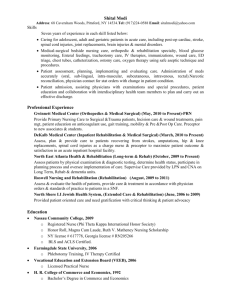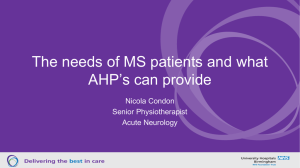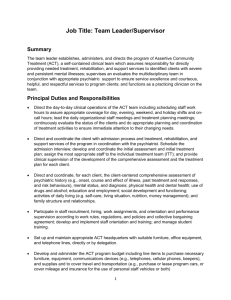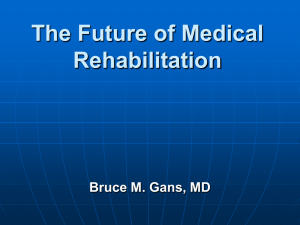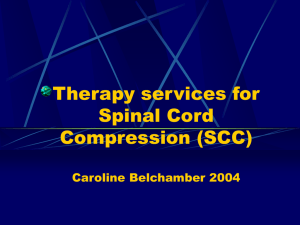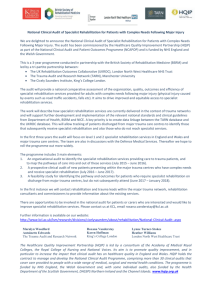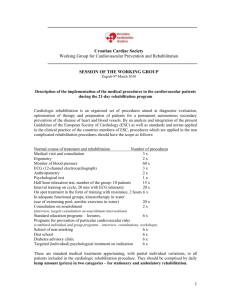Complex Neurological Rehabilitation Referral
advertisement
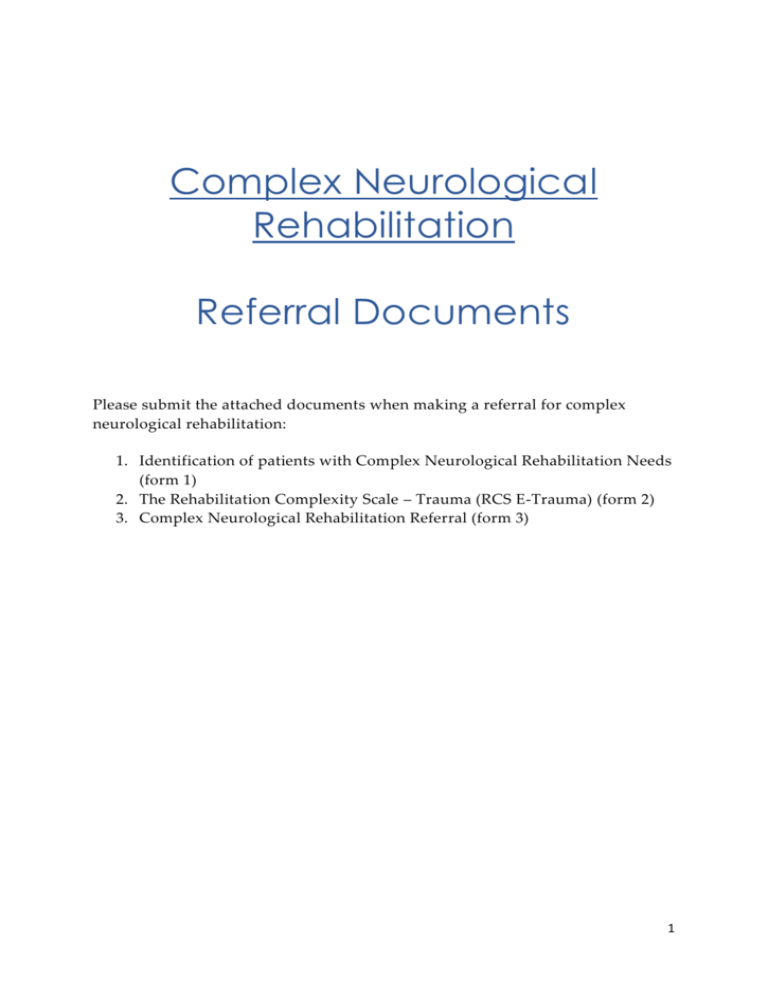
Complex Neurological Rehabilitation Referral Documents Please submit the attached documents when making a referral for complex neurological rehabilitation: 1. Identification of patients with Complex Neurological Rehabilitation Needs (form 1) 2. The Rehabilitation Complexity Scale – Trauma (RCS E-Trauma) (form 2) 3. Complex Neurological Rehabilitation Referral (form 3) 1 Identification of patients with Complex Neurological Rehabilitation Needs (form 1) The following table must be used as a guide to identify the level of need required for patients with complex rehabilitation needs. Please circle the descriptors which apply to the patient in question. Domain Medical management High level needs Unstable medical/ surgical problems Complex investigations/ intervention required 24 hour medical cover required on-site Medium level needs May require specialist medical management May have medical problems requiring routine investigation/ monitoring/intervention Currently well but potentially unstable Clinical Comments Neuropsychiatric needs Complex/unstable psychiatric needs Psychiatric condition stable, but requires monitoring High risk management Low level needs Medically stable Basic investigations/ monitoring may be required May have a wide range of medical conditions No psychiatric condition Low or no risk Medium risk management Treatment under section of the Mental Health Act Clinical Comments Nursing care High physical dependency and frequent monitoring required Low awareness state 2 carers required for the majority of care needs No need for skilled nursing Qualified staff nurse No tracheostomy interventions required e.g. monitoring, dressings, medication Specialist nursing care interventions required Clinical Comments Tracheostomy/ ventilatory Unstable tracheostomy requiring intensive suction Tracheostomy in situ but stable No tracheostomy Oxygen saturation 2 monitoring programme Active weaning programme Assisted ventilation Clinical Comments Swallowing/ nutrition Clinical Comments Physical disability Complex swallowing evaluation (e.g. FEES) Enteral feeding programme Normal diet/stable diet Complex nutritional requirements requiring intensive dietary support/ intervention Moderate monitoring required for food consistency and/or diet content Able to eat independently or with supervision from care staff Dietary education required (ie healthy eating and weight reduction) Standard diet/ weight monitoring 2-3 trained therapists/ trained staff at one time to treat Routine physical issues Higher function problems only Complex postural tone/contracture management Moderate physical disability requiring some specialist interventions 1-2 required to treat No/low level of physical disability Specialist interventions required to manage spasticity Clinical Comments Cognition Severe cognitive problems – intensive support required for carry over or orientation Complex cognitive/ neuropsychologist assessment required Highly structured environment required to enable functioning Moderate cognitive problems Higher function problems only Routine cognitive assessment required by occupational therapy team No cognitive problems Strategies may be required to enable functioning 3 A structured/semistructured environment may be required to enable functioning Clinical Comments Behavioural Highly challenging behaviours (physical/verbal/aggressi on) Interactive behavioural management programme required 1:1 specialling for safety and behaviour management May be a danger to self or others Mild/moderate behavioural problems generally managed well with a behaviour management care plan Minimal/ no problems with behaviour – managed effectively A structured environment may be required Compliance with care Some monitoring may be required Mild/moderate problems in compliance with care A secure facility is not required A secure facility may be required Risk of wandering or absconding Significant problems in compliance with care A secure facility required Clinical Comments Mood/emotion Severe anxiety/depression/emo tional lability Specialist evaluation required Mood disorder/adjustment issues under active management with planned programme No significant mood/adjustment issues Active management and frequent crisis intervention required Clinical Comments Communication Complex communication Moderate communication problems such as difficulties dysphasia combined with Able to communicate Higher function problems only No 4 cognitive/perceptual problems basic needs and ideas with/without aids communication problems Complex disability management interventions required such as: evaluation of low awareness state neuro-palliative rehabilitation/ end of life care Standard disability management required such as: set-up of care programme care booklet carer training None required Complex placement/housing/fund ing issues requiring extensive multi-agency negotiation Active discharge planning requiring liaison with community social worker, district nurse, occupational therapist to arrange care package No major discharge issues, taken care of by family/allocated social worker Complex communication aid set up/provision required Specialist assistive technology required Clinical Comments Complex disability management Clinical Comments Social/discharge planning Safeguarding concerns identified – high risk Clinical Comments Family support Clinical Comments Emotional pressure on staff Clinical Comments Vocational Potential safeguarding concerns – moderate to low risk No safeguarding concerns Major family distress Routine family support issues requiring frequent needs (met by planned support or crisis meetings) intervention No significant family problems Demanding situation requiring highly experienced staff/extra support for staff Somewhat challenging situation but manageable Minimal or no emotional pressure on staff Specialist vocational Moderate vocational No significant 5 rehabilitation Clinical Comments Medico-legal issues Clinical Comments Specialist equipment/ facilities Clinical Comments Therapy rehabilitation needs such as: multi-disciplinary vocational assessment multi-agency support for return to work support such as: work visits or employer liaison support for other roles e.g. homemaker/ parenting needs for vocational support Complex medico-legal issues requiring interaction with the legal system such as: complex best interests decisions court of protection applications DoLs/PoVA applications Litigation issues Complex mental capacity/consent issues Standard medico-legal issues such as: Mental capacity evaluation Standard consent/best interests decisions LPoA, advance care planning No significant medico-legal issues Highly specialist equipment/facilities required such as: Bespoke assistive technology Highly specialist seating/wheelch air needs Bespoke orthotics Electronic assistive technology Assisted ventilation Moderate specialist equipment needs such as: Adapted wheelchair/seating Electric standing frame Treadmill/harness training Assisted cycling e.g. motor-med Splinting/casting No equipment needs Intensive coordinated Therapy teams Less intensive Basic off the shelf equipment only Standard exercise facilities e.g. plinth, bike, tilt table, parallel bars 6 type/intensity therapy programmes required specialising in complex neurological conditions Up to 5 therapy disciplines involved in therapy Moderate to intensive therapy programmes required More than 25 hours total therapy time per week High intensity staffing ratios required ie 2 or more to treat at one time Up to 4 disciplines involved in therapy 20-25 hours of total therapy time per week therapy Short rehabilitation programmes Rehabilitation may be required as part of a specific diagnostic group (e.g. stroke) – treatment by a local specialist team Restoration of function Non-specialist rehabilitation Local services 1-3 therapy disciplines may be required Clinical Comments Length of rehabilitation Clinical Comments Level of need Medium to long term rehabilitation (2-4 months, but could be up to 6 months or more) Medium length Short term rehabilitation (1-3 rehabilitation of 6months, up to a maximum 8 weeks of 6 months) Category A needs Category B needs Category C needs Clinical Comments 7 The Rehabilitation Complexity Scale – Trauma (RCS E-Trauma) (form 2) PATIENT IDENTIFICATION Name: Hospital No: Date of score:…../…../……. For each subscale, circle highest level applicable MEDICAL NEEDS Describes the approximate level of medical environment required for medical/surgical/trauma management M1 Basic investigation / monitoring / treatment (Requiring non-acute hospital care, could be delivered in a community hospital with day time medical cover) M2 Specialist medical / psychiatric intervention Specialist investigations – blood tests, imaging etc. On-site co-ordinated specialist opinion / intervention Access to specialist medical equipment for assessment /monitoring etc. – for diagnosis or management/procedures (Requiring in-patient hospital care in (DGH or specialist) M3 Potentially unstable medical /psychiatric condition (Requiring 24 hr availability of on-site acute medical / psychiatric cover) M4 Post-acute general medical / surgical problem (Requiring general emergency medical / surgical intervention, but can be managed in DGH setting) M5 Post-acute care – with active acute trauma needs (Requiring acute step-down coordinated trauma care) M6 Hyper-acute trauma needs - extended range trauma care (Requiring hyper-acute coordinated trauma care only available in MTC) Type of medical / surgical intervention required: Medical Surgical Trauma Psychiatric Other…………………………… Orthopaedic / trauma Neurology neurosurgery Vascular Abdominal / Cardiothoracic Plastics/ burns ENT / Max-fax Urology Rehabilitation Medicine Other………………………………….. 8 BASIC CARE AND SUPPORT NEEDS Describes the approximate level of intervention required for basic self-care or level of risk (For all centres: score both care and risk and use highest score) CARE: Standard rehab needs RISK: Cognitive behavioural needs C0 Largely independent in basic care activities R0 No risk C1 Requires help from 1 person R1 Low risk – standard observations only for most basic care needs C2 Requires help from 2 people But requires escorting outside the unit R2 Medium risk – above standard observations OR managed under MHA section R3 High risk – above standard observations for most basic care needs C3 Requires help from ≥3 people for basic care needs C4 Requires constant 1:1 supervision AND managed under MHA section R4 – for safety or behavioural management Very high risk Requires constant 1:1 supervision SKILLED NURSING NEEDS Describes the level of intervention required from qualified or skilled rehab nursing staff N0 No needs for skilled nursing Tick nursing disciplines required: N1 Requires intervention from a qualified nurse (e.g. for monitoring, medication, dressings etc) N2 Requires intervention from trained rehabilitation nursing staff and/or mental health nurses N3 Requires specialist nursing care General registered nursing ITU nurse Specialist trauma nurse (e.g. orthopaedic, amputee etc) Rehab-trained nurses Mental Health (RMN) Other………………………….. (e.g. for tracheostomy, behavioural management etc) N4 Requires high dependency specialist nursing (e.g. medically unstable, very frequent monitoring/ intervention by a qualified nurse - hourly or more often) 9 THERAPY NEEDS Describes the approximate level of input that is required from therapy disciplines Therapy Disciplines: State number of different therapy disciplines required to be actively involved in treatment TD 0 0 TD 1 1 disciplines only TD 2 2-3 disciplines TD 3 4-5 disciplines TD 4 ≥6 disciplines Tick therapy disciplines required: Physio O/T SLT Dietetics Social work Psychology Counselling Orthotics Prosthetics Rehab Engineer Music/art therapy Play therapy/school DEA/Jobcentre Plus Recreational therapy Other : Therapy Intensity: State overall intensity of trained therapy intervention required from team as a whole TI 0 No therapy intervention (or<1 hour total/week - Rehab needs met by nursing/care staff or self-exercise programme) TI 1 Low level – less than daily (e.g. assessment / review / maintenance / supervision) OR Group therapy only TI 2 Moderate – daily intervention - individual sessions with one person to treat for most sessions OR very intensive Group programme of ≥6 hours/day TI 3 High level – Daily intervention with therapist PLUS assistant and/or additional group sessions TI 4 Very High level – very intensive (e.g. 2 trained therapists to treat, or total 1:1 therapy >30 hrs/week) Total Total T score (TD + TI) :…………. EQUIPMENT NEEDS Describes the requirements for personal equipment E0 No needs for special equipment Basic Special Equipment E1 Requires basic special equipment Wheelchair/seating Pressure care Highly Specialist Equipment Environmental control Communication aid 10 E2 Requires highly specialist equipment (e.g. electronic assistive technology or highly customized equipment) E3 Requires extremely specialist equipment Standing frame Off-shelf orthotic Walking aid Other…………………… Customised seating Customised standing aid Customised orthotic / brace Assisted Ventilation Other…………………… State equipment type: (ie Really fancy hi-tech trauma equipment only available in MTC!) TOTAL SCORE SUMMARY Needs Totals: Currently gets Medical / Surgical / Trauma / Psychiatric treatment M: Medical: / 6 M: NA D Other.. Basic care and support C: Care / 4 C: NA D Other.. Skilled Nursing care N: Nursing / 4 N: NA D Other.. Therapy TD: TD: NA D Other.. scores Reason for unmet need (E.g. Not available (NA), declined (D), or Other…) (Includes risk management) Specialist equipment TI: Therapy: / 8 TI: NA D Other.. E: Equipmen t / 3 E: NA D Other.. Summed RCS / 25 Gets /25 11 Complex Neurological Rehabilitation Referral (form 3) Contact Details Applicant Details Name Address/ Trust Tel Email Patient Details Name Address Hospital ID no. NHS number Date of Birth Consultant GP name GP practice address Intervention Details Patient diagnosis Date of injury Consent to referral gained: Does the patient have capacity to consent? If not, who has given consent? By what authority? Social history Level of physical function prior to injury (mobility, transfers) Rehabilitation Complexity Scale Score Problem list – top 5 problems Current intervention with disciplines involved and level/frequency of input Specialist equipment required 12 Summary of progress to date within 500 words (including progress with outcome measures) UK ROC classification of current unit Requested intervention (primary intervention required within a goal oriented rehabilitation programme) Ventilated patient – monitoring and weaning required □ Cognitive rehabilitation □ Neuro-behavioural rehabilitation (1:1 nursing support) □ Post-acute active goal oriented rehabilitation (3-6 months) □ Other likely rehabilitation requirements (please specify): Justification for why the patient’s needs cannot be met at the current provider Level of service required Level 1a□ Level 1b□ Level 2a□ Level 2b□ Level 3a□ Level 3b□ Future goals for specialist rehabilitation with timescales (specific, measurable, achievable, realistic, timed SMART) Or Goal Attainment Scale (GAS) goals Recommendations for length of on-going rehabilitation Recommendations of specialist rehabilitation unit (>1 provider) Other information 13
